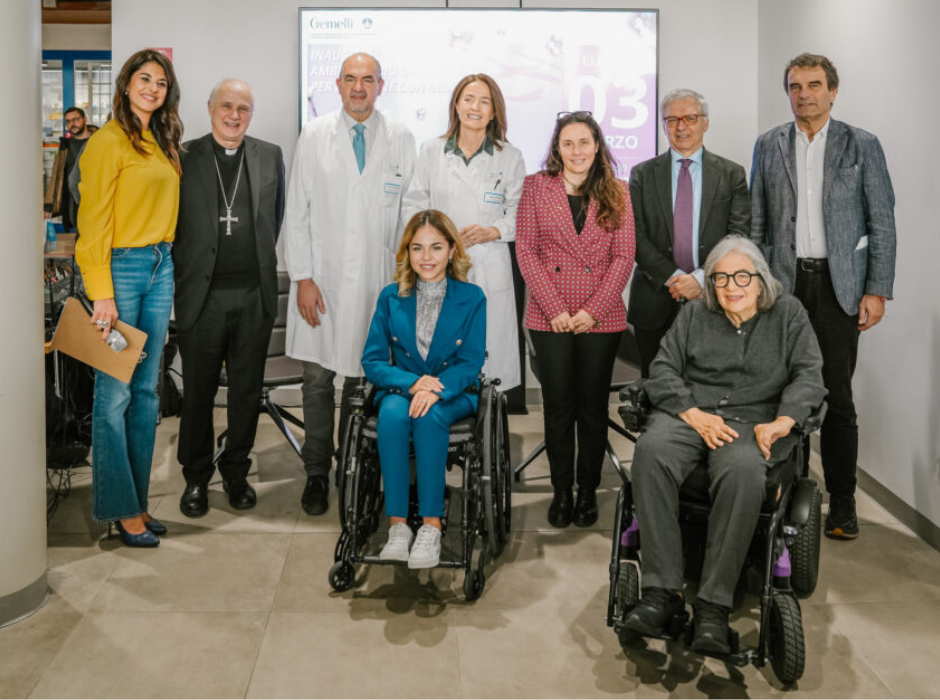Professor Testa, why did you decide to set up a special outpatient clinic for women with disabilities?
It’s something I had felt was urgently needed for a long time. As I met with these patients’ day after day, I finally thought to myself: “Not having a dedicated service for women with disabilities is unacceptable”. Women with disabilities often report that they face more difficulties in accessing gynecological examination for several reasons like physical barriers. This is an important issue in terms of equality and rights. Beside this, my colleagues in the neurology department have found that mothers of children with disabilities often prioritize the care of their children over their own medical needs, sometimes for years. That is why we offered free consultation to the mothers of children with neuromuscular diseases within the Donnenmd project, a specific path dedicated to women and neuromuscular diseases.
How did the opportunity for the creation of this lab come about?
We collaborated with the Nemo Pediatric Centre, which specializes in treating patients with neuromuscular diseases. Thanks to innovative therapies, the first girls with SMA who were treated as children by Professor Eugenio Mercuri are now in their twenties and have graduated from university. These young women are beginning to ask a lot of questions: Can I take the pill? Can I have children? That’s when the idea emerged to create a space specifically for them.
What are some of the specific problems that make it difficult for women with disabilities to access gynecological care?
It’s often difficult for patients in wheelchairs to access standard outpatient clinics and they need a multidisciplinary approach and longer visits. In order to support women with disabilities we decided to create a larger accessible space with many devices including an automatic examination chair, a lifter, and a private area with a curtain to give patients the privacy they need to change. Basically, we put into practice the concept of reasonable accommodation, as outlined by the United Nations Convention on the Rights of Persons with Disabilities: not to treat patients with disabilities differently, but to ensure they have access to the same care as everyone else and targeted to their needs, in this case, gynecological examination.
How important are similar strategies for making healthcare more inclusive, more sustainable, and more accessible today?
Let me tell you this: I’ve been involved in a project called “Villaggio per la Terra” (Village for the Earth) for ten years. I never pictured myself playing a role in environmental protection, but as you grow older, you realize that even as a doctor, you can’t ignore these issues. This year, among the many associations in the Village, there was a group of women with disabilities called “Ruote a Spasso” (Wheels on the Go), who assess accessibility in tourist facilities. They have created a brand called “usabile” (usable) and our clinic is the first one they plan to evaluate for potential “certification”. Another major event was a workshop where medical students (170 of them this year) had the chance to experience what it’s like to move around in a wheelchair.
With all that in mind, how important is technology in supporting an outpatient clinic like this?
It’s essential. We now have a specialized ultrasound machine, and an examination chair specifically designed to provide comfort to patients with disabilities, thanks in part to the support of leading technology and imaging companies with whom we have worked for years. Looking ahead, I see immense potential in telemedicine and home-based technological support, especially for patients with mobility challenges. But we mustn’t overlook the organizational aspect: we often prioritize technological advances while neglecting the organizational component that is critical to disability. It’s all about interaction and organization.
Training is key: do you feel that doctors today are adequately trained in inclusion and accessibility issues?
We still have a long way to go, but I’m encouraged by recent progress. For instance, the solidarity committee established by Antonio Gasbarrini, the Dean of the Faculty of Medicine and Surgery at the Università Cattolica del Sacro Cuore, unites 50 organizations committed to social inclusion and outreach.
The gynecology clinic for women with disabilities at the Agostino Gemelli University Hospital Foundation is not only an important innovation in healthcare, but also a model that can be replicated in other healthcare settings. As Professor Testa emphasizes, this does not necessarily require significant financial investment, but rather a change in perspective and a willingness to overcome physical and cultural barriers. In a truly inclusive healthcare system, disability cannot and should not be a barrier to accessing care.

